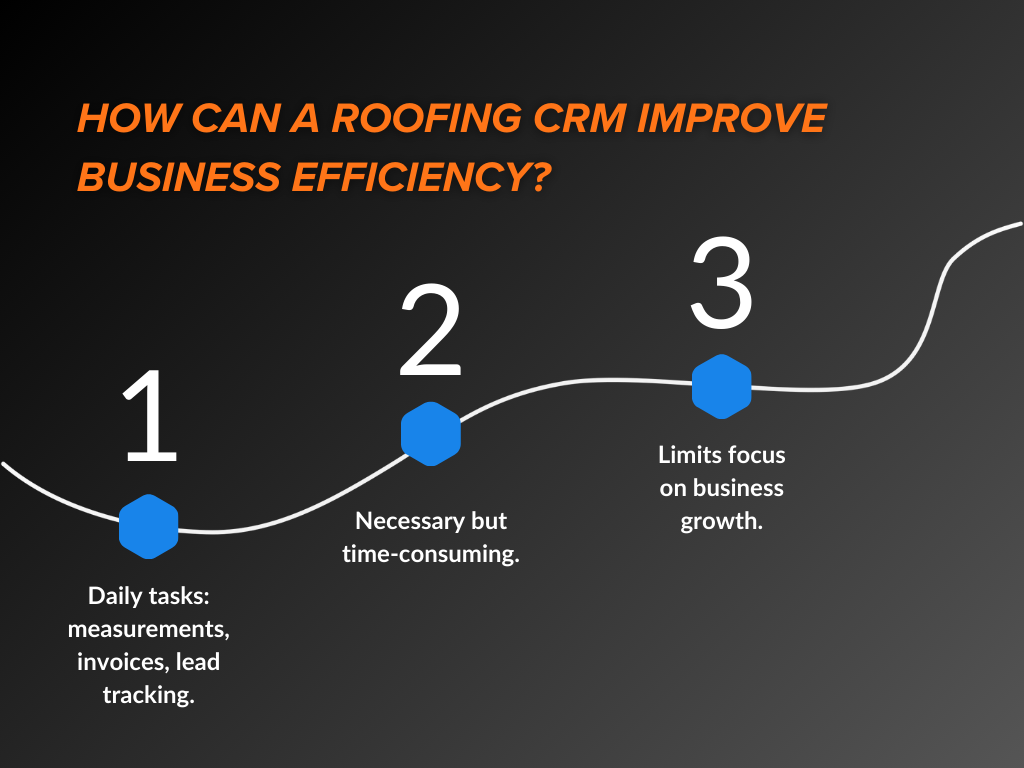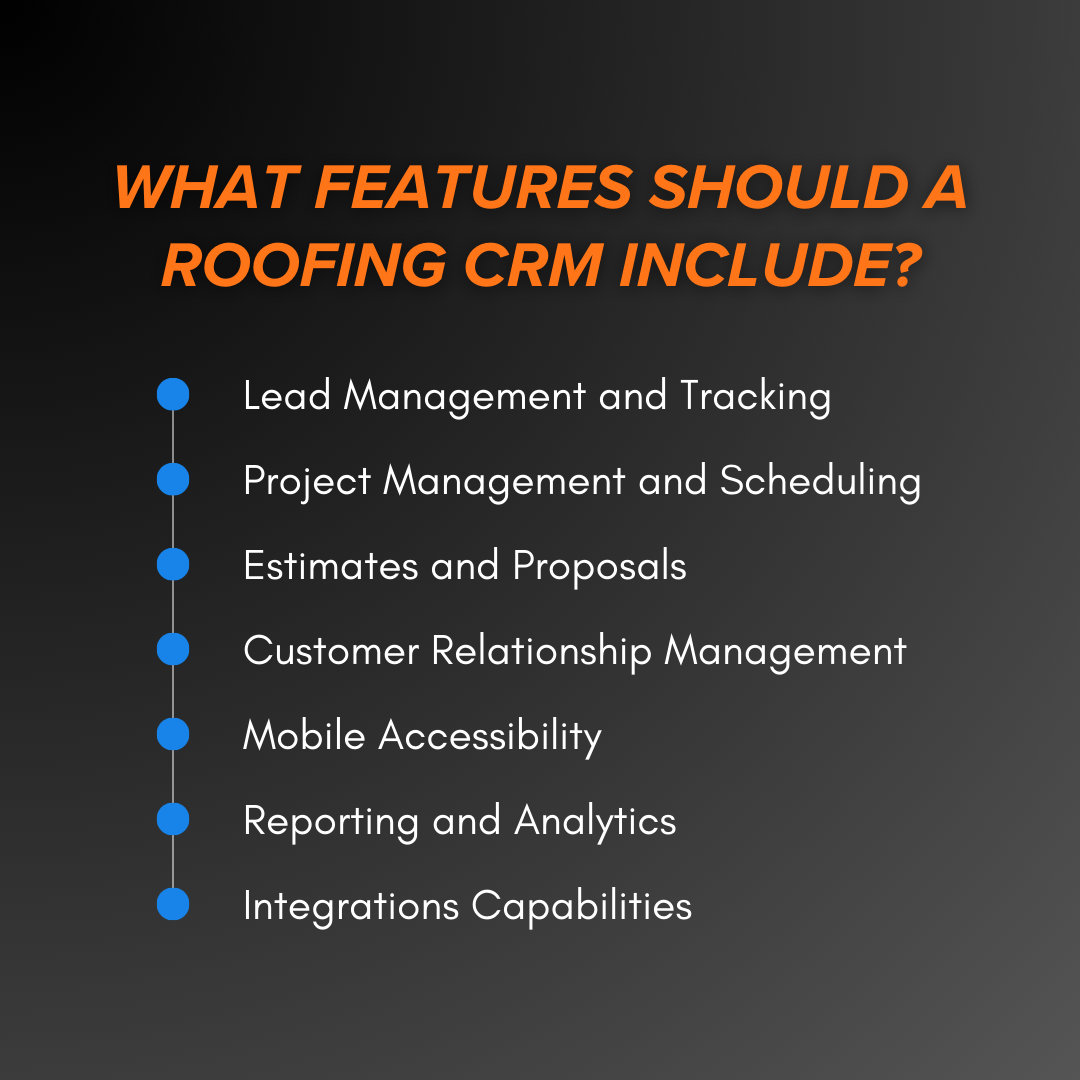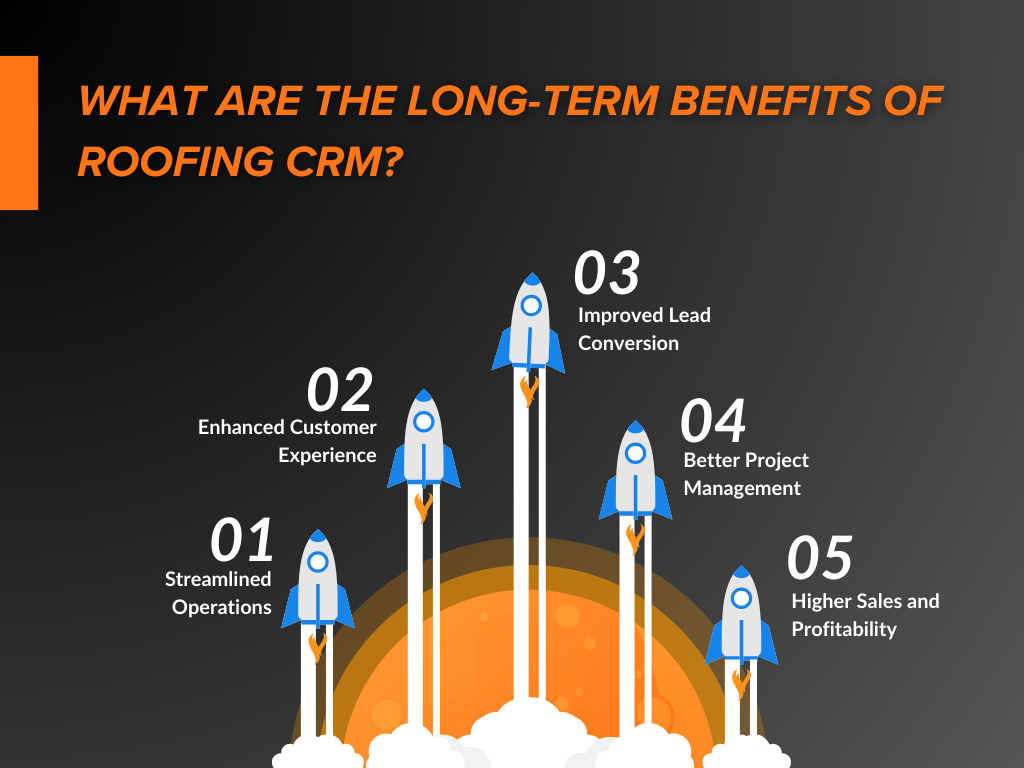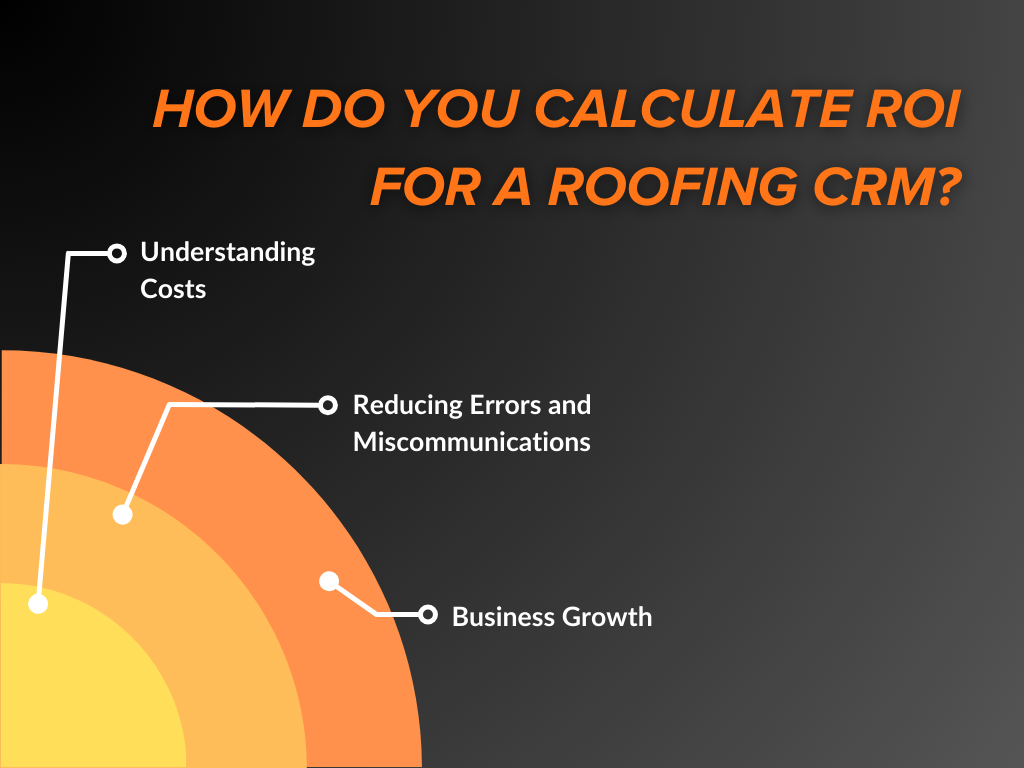October 1, 2024
Roofing CRM
What’s the fastest way to transform a disorganized roofing business into a well-oiled machine? Better communication tools? Streamlined project management? Or maybe the right roofing CRM?
Choosing the right CRM for your roofing company might be like finding the perfect tool in a cluttered shed, it's necessary but daunting. With so many choices, it's normal to become lost in an endless list of features, payment schedules, and technical jargon.
Roofing companies face unique problems such as coordinating field workers, managing client relationships, and precisely tracking project dates, which necessitate a tailored solution.
Let's find out how to choose a CRM that not only meets your business needs but helps you thrive in a competitive market.
Key Takeaways
- Understand the needs of your business to examine the unique needs, including lead management, project monitoring, and customer communication, before selecting a roofing CRM to find an approach that works.
- Essential features matter, look for CRM features like lead tracking, project management, mobile access, estimates, reporting, and integrations with existing tools to enhance workflow efficiency.
- A well-chosen CRM can improve customer connections, and team cooperation, eliminate manual activities, and increase sales effectiveness, resulting in higher efficiency.
- Calculating the ROI (Return on Investment) for a roofing CRM helps determine its long-term value by evaluating the investment against the benefits.
- To fully utilize the CRM, consider feedback from your team while making your selections and make sure you receive thorough training.
How can a Roofing CRM improve business efficiency?

Taking measurements, creating invoices, and monitoring leads are just a few of the daily responsibilities that roofing contractors face. Although these are necessary to keep your business operating, they are time-consuming chores that hinder you from growing it even more.
For roofing contractors, CRM software is an essential tool that ensures alignment with all team members and streamlines operations. It enables managers to stay informed, simplify operations, and communicate with clients and production teams.
However, adopting the incorrect option may result in missed opportunities, poorly handled projects, and costly inefficiencies. Creating estimates, keeping track of information, and providing analytics are just a few things that roofing CRM software handles for you as part of your home repair company.
Effective customer relationship management software boosts productivity and helps homeowners stay informed about project and payment status.
Key Statistic:
Over 5 million new roofs are installed annually in the US, where 7% of the 75 million residential properties require re-roofing every year.
Here's Why Your Roofing Business Needs a Roofing CRM.
What features should a Roofing CRM include?

Let’s break down the essential features roofing business owners should look for:
1. Lead Management and Tracking
Think about how simple it would be to collect and nurture leads from your website, cold calls, and referrals. You can prioritize prospects, keep track of lead engagements, and automate follow-ups with the help of a CRM system.
One of the biggest pain points for roofing companies is handling leads throughout the sales process. Comprehensive lead management and monitoring features are essential for roofing CRM software so that roofing contractors can effectively collect, arrange, and nurture leads.
The software should automatically send reminders and follow-ups from the moment an inquiry is submitted until the transaction is closed, making sure that no potential client is overlooked.
2. Project Management and Scheduling
A project's success can be determined by its timetable, which should be well-organized and transparent because roofing services frequently require several teams to work in the field.
Once a project begins, it is highly important to maintain things on schedule. To help roofing contractors manage work timelines, allocate jobs, and make sure crews are where they need to be at the correct time, a roofing CRM must have project management and scheduling features.
Project management tools give roofing professionals an overview of all active works, avoiding delays and assisting with resource optimization.
3. Estimates and Proposals
Roofing contractors can close transactions more quickly and gain a competitive edge in a highly competitive sector by streamlining the proposal process.
Every roofing company needs a quick and dependable method for producing precise estimates and proposals.
A roofing CRM should incorporate customizable templates for contractors to quickly draft and deliver professional quotes, enhancing the sales process and allowing for clear pricing for roofing professionals.
4. Customer Relationship Management
Customer relationship management software, which includes automated follow-ups, email marketing tools, and reminders, assists roofing business owners in staying in touch with clients even after a job is completed, generating chances for future work and maintaining client retention.
Customer relationship management is the fundamental feature of every CRM software. Establishing reliable connections with clients makes it possible for roofing firms to receive referrals and repeat business.
The CRM should save customer interaction history, from initial contact to project completion, so that your sales team has complete visibility into each customer's journey.
5. Mobile Accessibility
Roofing services can remain on schedule and teams can react fast to any changes in the schedule, client requests, or unanticipated problems on the job site using mobile access.
This adaptability guarantees efficient operations and lowers the possibility of misunderstandings. Roofing contractors and their teams spend the majority of their time in the field, therefore mobile accessibility is a necessity.
A mobile app for roofing CRM software could allow field agents to access vital project data, update task statuses, and have real-time communication with the office.
6. Reporting and Analytics
Rooftop business entrepreneurs who wish to scale their operations must adopt a data-driven approach. A roofing CRM's reporting and analytics capabilities let businesses monitor key metrics like customer satisfaction, project profitability, and sales effectiveness.
The best roofing CRM will have configurable dashboards to track everything from lead generation to project completion times. These insights enable roofing contractors to enhance their sales procedures, make more profitable decisions overall, and make better business decisions.
7. Integration Capabilities
Roofing CRM software should work seamlessly with other tools used by your roofing company, such as accounting software, marketing platforms, and project management tools. You can reduce manual data entry, streamline your workflow, and boost productivity by linking your CRM with other programs.
Roofing companies can benefit from these integrations since they help simplify back-office processes and free up the employees to concentrate more on providing excellent roofing services than on tedious administrative tasks.
Read our blog, to learn more about How can Roofing Management Software help with Estimating and Quoting in the Roofing Industry.
What are the long-term benefits of Roofing CRM?

Let's explore them.
1. Streamlined Operations
From chaos to clarity, roofing CRM optimizes workflows, boosting productivity.
Juggling multiple tasks, managing crews, and keeping track of customer interactions can be challenging in the roofing industry.
With a roofing CRM, you can manage all your important data in one place, including leads, customer details, project updates, and more. This makes daily activities easier to complete, cuts down on manual labor, and improves your ability to run your company.
2. Enhanced Customer Experience
CRM makes it easy to personalize every interaction, build trust, and grow relationships.
A CRM isn’t just about internal operations; it plays an important role in providing improved customer service. Your sales staff can provide individualized service that addresses each client's needs by keeping a thorough record of their interactions with your company.
In an industry where word-of-mouth referrals and repeat business are key, roofing businesses that continuously provide excellent service will stand out.
3. Improved Lead Conversion
Roofing CRM streamlines conversion from lead to lifelong customer.
A roofing CRM increases the likelihood of converting prospects into paying clients by optimizing the lead conversion process.
In the long run, this increases revenue and gives your company a more steady and predictable sales pipeline. Your market share in the roofing sector increases as you convert more leads.
4. Better Project Management
Synchronize teams and streamline projects.
Improved project management eventually results in fewer delays, better-quality work, and increased productivity throughout roofing operations.
Roofing firms can take on additional projects without sacrificing quality by improving project management, resulting in increased recommendations.
5. Higher Sales and Profitability
Always keep projects on track and profits on the rise.
Increasing sales and profitability is one of the biggest long-term advantages of utilizing a roofing CRM.
Furthermore, a CRM offers insightful data via analytics and reporting, assisting your sales staff in finding ways to boost productivity and streamline your sales processes. These small changes over time result in increased profit margins and a more efficient operation.
Here's an interesting blog on Inspection Revolution: How Roofing Software Are Transforming Roof Assessments?
How do you calculate ROI for a Roofing CRM?

Investing in a roofing CRM has the power to change your company, but how do you know it's worth the money? Let's break it down.
1. Understanding Costs
Start by determining the CRM's upfront expenses, which include the software subscription, setup fees, training, and any customizations necessary for your roofing company.
Consider continuing costs such as maintenance or upgrades. Knowing the CRM's overall cost can help you set a starting point for your ROI analysis.
2. Reducing Errors and Miscommunications
A roofing CRM improves sales operations and job management by minimizing errors and miscommunications between your sales team and field workers.
Fewer mistakes lead to fewer project delays, saving both time and money. Increased customer satisfaction from improved accuracy results in recommendations and repeat business, two important indicators for assessing CRM performance.
3. Business Growth
CRM has a direct impact on three important business growth factors- improved lead monitoring, sales pipeline management, and customer relationship management.
Determine how the CRM will increase deal closing, project management effectiveness, and customer retention for your company. The ROI of CRM is seen in the rise in sales and overall efficiency compared to pre-CRM performance.
How do you assess the best Roofing CRM options for your needs?

Here’s a step-by-step guide on how to assess the best roofing CRM options for your needs:
1. Define Clear Objectives
Start by deciding what you want the CRM to do.
Do you want to track projects, handle leads more efficiently, or communicate with customers more effectively? Setting clear objectives will enable you to concentrate on CRMs with the functionality you require.
2. Involve Your Team in the Selection Process
Consult with your staff; they will be the ones utilizing the program daily!
Sales reps, project managers, and office staff all have distinct needs; by involving them in the decision-making process, you can ensure that the CRM is useful to everyone and gain more buy-in when it comes time for implementation.
3. Provide Comprehensive Training
If your staff isn't proficient in using the CRM, even the greatest one won't be useful.
After making your decision, spend money on in-depth training to ensure are familiar with the system and can fully utilize its features.
In a nutshell
According to Allied Market Research, The US roofing industry is expected to reach a market size of an astounding $156.0 billion by 2030, with a robust compound annual growth rate (CAGR) of 4.3% from 2021 to 2030.
This suggests that the roofing sector is expected to have significant growth in the next ten years. This positive projection highlights the industry's adaptability and room for growth, which are fueled by several variables.
Roofing firms could grow in this thriving industry and take advantage of the many opportunities that lie ahead if they embrace innovation like Roofing CRM, prioritize sustainability, and adjust to shifting market conditions.
About Sunbase
Start your search for the perfect roofing CRM now!
Maximize your ROI, streamline your operations, and provide exceptional customer service with Sunbase Roofing CRM.
FAQ's
Q1. How can you ensure that your team adopts the new CRM successfully?
Ans - Provide comprehensive training sessions to ensure know how to use the CRM efficiently. Onboarding assistance and courses are provided by numerous CRM providers, such as Sunbase. Incorporating your staff within the selection process will increase their commitment to adopting the system right away.
Q2. How do recognize the need for a roofing CRM?
Ans - A roofing CRM might be a useful tool if you're having trouble with manual operations, are overburdened with paperwork, or want to increase customer retention.
Q3. What is the difference between a CRM and project management software?
Ans - While both technologies can help with project management, a CRM concentrates on customer interactions, sales processes, and data analysis, whilst project management software focuses on task management and scheduling.
I agree to receive marketing messaging from Sunbase at the phone number provided above. I understand data rates will apply, and can reply STOP to OPT OUT.







